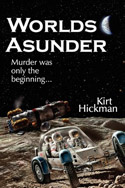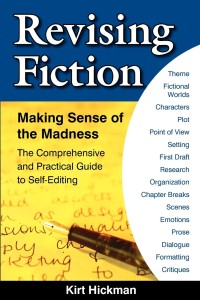by Kirt Hickman
Realistic dialogue is one of the most difficult things for some writers to achieve. Compressing your dialogue to as few words as possible will help. If you’ve done that and the dialogue still rings false, look between your quotation marks for these deadly sins.
Everyday Dialogue
Skip the pleasantries every reader knows occur at the beginning and end of a conversation:
“Hi.”
“How are you?”
“I’m fine. How are you?”
It’s boring. Start the conversation at the point where it becomes interesting.
Informative Dialogue
Never have a character say something that everybody in the conversation already knows.
Consider this passage from an early draft of my science fiction novel Worlds Asunder in which Snider speaks with the manager of Stellarfare, a commuter starline:
“May I remind you,” Snider said, “that NASA is your regulatory authority. I can revoke your license to fly from Lunar Alpha.”
“Don’t bully me. NASA is funded by taxation of the businesses that operate from its bases. Stellarfare alone supplies a third of that funding for Lunar Alpha.”
Both characters know this and the only person who doesn’t know this is the reader. That’s who these characters are talking to, not to each other.
Informative dialogue can often be corrected by moving the information from the dialogue to the thoughts of your viewpoint character:
“I’ll revoke your license to fly from Lunar Alpha.” Snider’s voice shook with forced civility.
“Don’t bully me. Revoke our license and it’ll be the last thing you do as director. When you’re replaced, we’ll return.”
He was right. Damn it, the manager was right. Stellarfare provided a third of NASA’s funding for Lunar Alpha. Snider’s threat had only solidified the man’s resolve.
Direct Address
Direct address occurs when a character says the name of the person he’s addressing:
“What time is it, Jennifer?”
She consulted her watch. “Four o’clock, Tommy.”
Notice how natural the dialogue feels when I remove the characters’ names from the spoken lines:
“What time is it?” Tommy asked suddenly.
Jennifer consulted her watch. “Four o’clock. “
Self-talk
Often, when a character talks to himself, the author is using contrived dialogue to relay the character’s thoughts, as is done in this passage from a critique submission (reprinted with the author’s permission):
“I feel like I’ve been run over by a Mack Truck,” he moaned. “Where am I anyway?”
He rolled his eyes from side to side and tried to think. “I can’t see a thing,” he said aloud and tried to sit up again. This time the ground moved beneath him.
“Oh oh,” he said. “An earthquake?” He tried to concentrate. “Naw. It’s not like that at all. It feels more like ball bearings rolling around under me.”
Because your scene is written from your character’s viewpoint, you can communicate his thoughts without having him say them out loud:
Luke’s body ached like he’d been run over by a Mack Truck. He rolled his eyes from side to side in the darkness to clear his head.
The earth began to shake. Not like an earthquake. More like ball bearings rolling around beneath him. “Whoa.” It was the strangest thing he’d ever felt.
Mismatched Dialogue, Actions, and Emotion
Consider the following passage:
Jorge slammed his fist on the table. “Well, you know, I really don’t think that’s such a good idea.”
If the speaker’s words are inconsistent with his actions, the reader won’t believe whatever emotion you’re trying to show. Make your character’s dialogue match his emotions:
Jorge slammed his fist on the table. “Over my cold carcass.”
Overuse of the Exclamation Point
Reserve exclamation points for when your character is genuinely shouting.
Neglecting to Read Out Loud
Once you’ve purged all of the sins described above, read your dialogue scene out loud for sound and pacing. Does it sound natural? Does it have the rhythm of speech? Is it tense and engaging? Have you achieved the desired pace? Only then will you know if it’s effective.
 Kirt Hickman is a technical writer turned fiction author. His books include three sci-fi thriller novels Worlds Asunder (2008), Venus Rain (2010) and Mercury Sun (2014), the high fantasy novel Fabler’s Legend (2011), and the writers’ how-to Revising Fiction: Making Sense of the Madness (2009).
Kirt Hickman is a technical writer turned fiction author. His books include three sci-fi thriller novels Worlds Asunder (2008), Venus Rain (2010) and Mercury Sun (2014), the high fantasy novel Fabler’s Legend (2011), and the writers’ how-to Revising Fiction: Making Sense of the Madness (2009).
This article was originally published in the June 2009 issue of SouthWest Sage, and is reprinted here by permission of the author.



